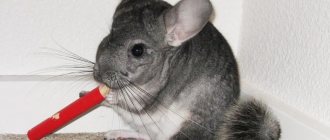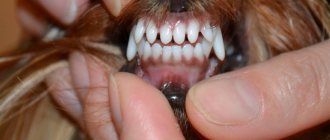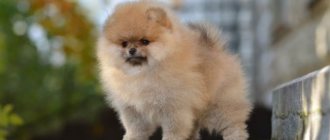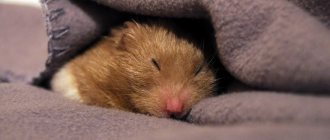The Spitz, like all dwarf dogs, needs constant care from its owner. The most common are Pomeranian Spitz, which in appearance resemble a bear cub. Anyone who decides to have this wonderful dog at home should be aware of how to care for a Spitz.
How to care for a Spitz
Spitz, like any other breed, has its own characteristics of appearance, behavior, and health. Even if you know how to care for small breeds, there are some specific care requirements for Spitz dogs.
How to choose a Spitz puppy
A puppy is usually adopted at the age of 1.5 - 2 months, when he begins to eat on his own. At this age, color is already visible, character is being formed, and all physiological features are clearly visible. Take a close look at the following parameters:
- condition of the skin, coat and the inside of the ears;
- on the gums and tongue: there should be no plaque on them;
- examine your teeth;
- the paws should be healthy and straight;
- the eyes should shine with a healthy shine;
- There should be no hernias in the abdomen and groin area.
A poor diet can lead to disruptions in the gastrointestinal tract
Pay attention to the general condition - the puppy must be healthy and playful. The breeder will give you a puppy passport, which indicates all veterinary vaccinations received. Find out right away what foods the breeder fed the puppy, so as not to change the feeding regimen in the first days.
Vaccination
Not everyone knows what diseases a Pomeranian Spitz should be vaccinated against. If you are not yet familiar with the most common Spitz diseases, you can read about them on our portal.
The first vaccine is given at one and a half months against hepatitis and enteritis. Before vaccination, which is given at a veterinary clinic, the puppy cannot be walked outside or even taken to visit. An unvaccinated Spitz is absolutely defenseless against viruses, so the only thing you can afford is to walk with the puppy in your arms for about 10 minutes in sunny weather.
The Spitz's immunity must be supported with vaccines and vitamin supplements.
4-5 days before vaccination you need to treat the puppy for worms. To do this, it is necessary to strictly calculate the dosage in accordance with age and weight. Anthelmintics can be given with food. After vaccination, you cannot bathe your orange for a week and you should limit its contacts with strangers so that the body, weakened by the formation of immunity, does not catch a viral disease. The vaccine against hepatitis and enteritis is re-administered after 2 weeks.
Please note that vaccination is always hard work for a dog’s body.
At 2 and a half months, the Spitz is vaccinated against distemper. This is a difficult vaccination for the body, after which it is not recommended to bathe the pet, take it out for walks, or even overwork it with particularly active games for 3 weeks. Throughout this period, immunity is being formed. Vaccinate against distemper again at 7 months. A puppy is vaccinated against rabies no earlier than 8 months.
Vaccination should be accompanied by deworming, which will protect the Spitz from allergies to vaccine components
Before each vaccination, you need to deworm your pet 4-5 days. Otherwise, side effects or allergic reactions to the vaccine may occur. After the last vaccination, the rest are given once a year according to the schedule drawn up by the veterinarian. Vaccination records are made by a veterinarian and confirmed by the institution’s seal in the International Veterinary Passport. Remember that an unvaccinated dog will not be allowed abroad with you.
Parasitic diseases of Pomeranian Spitz, control and prevention
You can raise a healthy Pomeranian if you know your enemy by sight. The list of dog parasites is extensive and daunting. However, they can be divided into 3 large groups, which have differences in infection, control measures and prevention.
Are fleas harmless?
In the warm season, fleas are found almost everywhere in nature. These jumping insects easily move through space until they find a warm-blooded host. Parasitizing on its skin, they bite through it and receive nutrition from the animal’s blood. A full development cycle of 50 days and abundant egg laying makes the population of these insects very tenacious.
Fleas rarely carry dangerous diseases because they do not try to change their host. However, there is harm from them:
- bites cause irritation to the skin of the Pomeranian Spitz; with a large area of damage, secondary infection is possible;
- insemination of the intestines by larvae causes allergies and decreased immunity;
- contact with fleas bothers the dog.
It is possible and necessary to fight fleas. Daily combing of the coat and inspection of the skin of the Pomeranian Spitz is the first step towards detecting the enemy and partially destroying it mechanically.
Since fleas lay eggs in the environment, an important means of preventing infection is to keep the house clean and timely disinfection of objects to which the Spitz has access (simple washing is sufficient).
To prevent fleas from getting on the skin, use anti-flea drops applied to the skin of the withers. Special collars for Pomeranians are not recommended - if worn constantly, they damage the hair in the neck area and often cause allergies in dogs of artificially bred breeds.
Ticks - high danger level
Unlike fleas, ticks often carry viral diseases that are harmful to the body of warm-blooded animals.
Before sucking, the tick injects an anesthetic secretion into the soft tissues, so the bite occurs unnoticed by the orange, and at first it does not show concern. If the tick is not infected, it will drink blood and leave the skin on its own without causing much harm to the Pomeranian. But now more and more individuals are infected with viral diseases, which does not prevent them from migrating over long distances and expanding their habitat.
During the warm season, ticks can be found in all areas with vegetation. In extreme heat and significant cold weather, it is inactive; thickets of trees and tall grass in shady places pose a danger.
The orange's natural temporary protection is its thick coat. Ticks, unlike fleas, are slow-moving creatures. It takes a lot of time to get to the place of attachment (to an area with thin skin).
Hence the preventive measures: carefully inspect the Spitz’s coat immediately after a walk, remove any ticks that get on it.
If you are not allergic to anti-tick sprays, you can use them, especially for adult Pomeranians.
Helminths in Pomeranian Spitz
Worms are parasites that live inside the host's body, most often in the intestines. Some species also develop in other organs. They can cause serious diseases (the most harmless of which are anemia and allergies) and even the death of not only a puppy, but also an adult Pomeranian.
It is impossible to avoid infection with helminths, but it is possible to prevent infection and the development of larvae through prevention (deworming).
Puppies are already given antiparasitic measures in the nursery, usually from 2 weeks of age. And they repeat them regularly. When transferring to a new owner, the veterinary passport indicates the date of the last administration of anthelmintic drugs and recommends further frequency of prophylaxis.
A healthy, seasoned animal that receives proper care can cope with helminthic infestation more easily than weakened individuals.
Thus, good care, proper maintenance, and development of the Spitz’s immunity significantly increases its chances in the fight and prevention of parasitic diseases.
If a Spitz barks
The purebred feature of the Spitz is that it barks loudly, loudly and often, which not all family members and neighbors like. However, if you take a small puppy, it is quite possible to raise him to be silent. In this case, barking should be prohibited from the very first day. There is no need to make any exceptions, even if the doorbell rings. In particularly difficult cases, you can seek the help of a dog handler.
Barking for a Spitz is a way of communication, so it is not always worth suppressing it
Remember that barking is not just an unpleasant habit, but an opportunity for the dog to express emotions, and often just love for the owner. If you want to ban barking, then the baby should have an alternative - jump on his arms or lap, for example.
Where to place a Spitz
A puppy, and then an adult dog, should have its own place to rest and sleep. Of course, this does not mean at all that this is where your pet will while away his rest time. Most likely, he will have 2-3 favorite places, but the main thing should also be.
It is important that your Pomeranian has a formal resting place.
It should not be in the hallway or kitchen, near the balcony or radiator. This should be a corner in which the dog can rest peacefully at any time of the day. Let this be your bedroom so that he does not feel lonely at night and has peace during the day. Just, of course, you shouldn’t take the puppy to bed with you. Then it will be quite difficult to wean him from such pastime.
For sleeping, you can buy a special basket or a plastic box carrier with a mattress at the pet store. In such a container with sides, the puppy will feel protected at night. To help your baby get used to this place, put treats or his toys inside.
Example of an enclosure for a Spitz
If you are often away and no one is home, it will not be a bad idea to purchase a dog kennel. It will not only help keep the furniture safe, but also ensure the safety of the baby and help him get used to the tray faster. In the enclosure, put a bed, toys, a bowl filled with drink and a diaper on the remaining free space. Gradually, the Spitz will get used to doing its business on it, and then you will transfer the same bedding to the tray.
Tray training
An ordinary cat box is used as a bathroom, the bottom of which is covered with disposable diapers or litter. The baby is introduced to it on the very first day - when he wants to relieve himself, he will begin to sniff the corners in search of a comfortable place. At this moment, he is transferred to a box and is not allowed to escape until the end of the process.
Important! To wean your Spitz from leaving puddles all over the house, you need to clean the problem areas and water them with any type of Antigadin.
After each successful visit to the baby's box, you need to praise him and offer him a treat. When raising a child, you cannot raise your voice or poke him into a puddle - he will not understand the meaning of the actions.
Feeding the puppy
The puppy must be fed at regular intervals, in a constant place, from dishes designated for this purpose. As for the number of feedings, they are distributed depending on the age of the individual.
Table 1. Spitz feeding frequency by month
| Age in months | Number of feedings |
| 2 | 5 times |
| 3-4 | 4 times |
| 5-6 | 3-4 times |
| 7 | 2-3 times |
| 8 | 2 times |
The diet of a growing dog should include:
- boiled sea fish with bones removed;
- boiled offal (after 7 months);
- cereals - rolled oats, rice;
- raw carrots;
Many Pomeranians enjoy eating raw carrots.
- fruits and dried fruits;
- fermented milk products: kefir, cottage cheese;
- vegetable oils;
- raw beef;
- boiled turkey or chicken breast.
Do not give your Pomeranian sweets, as they can lead to tooth decay and digestive problems.
Table 2. Diet of a three-month-old Spitz puppy
| Feeding | Products |
| First | Boiled fish with porridge and vegetables |
| Second | Dairy products |
| Fourth | Boiled breast without skin |
| Fifth | Grated carrots with one teaspoon of oil |
| Sixth | Raw scalded beef with vegetable stew |
Feeding an adult Spitz
Feeding a Spitz natural diet assumes that the basis of its diet will be non-fatty meat, sea fish, and offal. Meat is healthier raw, but to avoid becoming infected with helminths, it can be boiled for a couple of minutes. You need to completely eliminate fatty pork from your diet. Beef, chicken, as well as offal - liver, heart, tripe will be very useful.
Dogs are never allergic to fish. It is good for the coat and a rich source of protein, phosphorus and fatty acids. If there is no fish in your diet, you can replace it with a good fish oil, which should be added to your daily meals.
Fish oil will become a worthy equivalent of fish in the Spitz’s diet
Vegetables and grains are especially important in the diet of an adult orange. These are zucchini, cucumbers, tomatoes, carrots, beets - dogs eat all of this on a whim. Spitz should be given only seasonal vegetables, avoiding greenhouse vegetables. During the cold period, dried apricots, prunes and dried fruits will be healthier.
Prohibited Products
The dog is not allowed the following food from the human table - fatty, spicy, salty, fried, floury and sweet in any form. You should not feed your dog at any age pork, lamb, boiled sausage, frankfurters, or poultry bones (their sharp fragments can damage the gastrointestinal mucosa). Semi-finished products, smoked meats, baked goods, baked goods, and marinades should be excluded from the diet.
The list of prohibited foods for Spitz is similar to those for other breeds.
Food for Pomeranian Spitz
When feeding dry food, choose only premium food. Think carefully about the advisability of transferring your pet to drying. Such food is not cheap, and those that are cheap are only suitable for one-time feeding. Never mix natural feeding and drying. Only during the period of transferring a pet to dry food is it permissible to place dry food in a familiar dish for a month at each feeding, increasing its amount every day.
Royal Canin, designed specifically for Spitz dogs
Table 3. The best ready-made food for Spitz
| Class | Feed brands |
| Economy | Pedigree, Chappi |
| Premium | Brit Premium, Gemon, Dog Chow, Purina Pro Plan |
| Super premium | 1st Choice, Almo Nature, Brit Care, Bosch, Eukanuba, Hills |
| Holistic | Acana, Orijen, Farmina, innova |
Allergic reactions to food
You need to feed in accordance with the specified standards. Carefully study the packaging; usually the daily requirement is written on it, and not the amount of food per feeding. Remember that dogs can often have an allergic reaction to a product that has been in their diet for a long time.
Hypoallergenic series of Royal Canin food
The first symptoms of an allergy are dermatological manifestations, itching, the eyes may begin to water, and problems with stool may appear. In this case, it makes sense to give your pet an antihistamine and contact a veterinarian to identify the allergen. For allergy sufferers, many well-known manufacturers produce special hypoallergenic foods.
Spitz feeding rules
Remember that a negative reaction to food is the first sign of illness. If your dog has a persistent loss of appetite or exhibits all signs of a gastrointestinal disease, you should immediately contact a veterinarian—many dangerous and serious diseases begin with these symptoms.
At the first symptoms of indigestion or food allergies in your Spitz, you should contact your veterinarian.
Do not overfeed the dog - this is fraught with a serious imbalance in the functioning of the internal organs. The dog must eat its entire portion and nothing on top. Do not feed your dog from the table or indulge him excessively with treats. Just a few extra pieces per day can add up to a complete individual serving.
The main indicator of the state of the digestive system of a Spitz is wool.
Proper feeding of a Spitz is the key to long-term health of the pet, its good physical development, as well as a joyful mood. All feeding errors will immediately affect the condition of his coat. Therefore, if suddenly the dog’s appearance has become untidy, first of all, analyze the diet. Perhaps he simply lacks vitamins.
Training
In order for the pet not to be naughty and to obey the owner, you should pay attention to him and be patient. You can come to an agreement with a Spitz, but the use of physical force will not lead to anything good.
Care and maintenance includes training, and each species requires an individual approach.
The Pomeranian learns through play accompanied by praise and treats. The dwarf representative loves to dominate, so the owner needs to be stricter and not indulge the pet’s whims. The German Spitz also tries to take a leadership position. Thanks to his high intelligence, he is productive and quickly remembers commands. Japanese does not mind long exercises and interesting tasks.
The results of training are reinforced during walks. Spitz are smart dogs; if desired, they can be trained in circus acts.
Toilet
For the toilet, it is enough to purchase a regular litter tray from a pet store and cover the bottom with disposable diapers. From the very first day you should introduce your baby to this place. When the dog wants to empty his bladder, he will start looking for a place and sniffing corners. At this time, the puppy must be carefully picked up and transferred to the bedding in the tray. Then make sure that he doesn’t run away and does his business there.
During the first weeks, you need to keep an eye on the puppy and, if necessary, move him to the litter box.
In the first month, you need to carefully monitor the puppy and drop him off whenever he begins to behave suspiciously. Pet him after he's done. Even if the dog liked some other place, behave persistently and you can retrain him. Stock up on dog anti-repper just in case.
Pressure on the Spitz will lead to the fact that he will begin to fulfill his needs in secret from you.
Don't scold your puppy for making a puddle in the wrong place. He just doesn’t know how to calculate his strength yet and perhaps he just couldn’t wait to get to the litter box. Next time, out of fear of punishment, he will look for a toilet place where you cannot see it.
First days at home - what should you do?
As soon as Pomeranian puppy arrives in your home, do the following:
- Let your baby get comfortable, get used to it and get to know all the family members.
- Give your dog a name as quickly as possible and train him to use it.
- Show the puppy his place and let him know that he needs to sleep there.
- Develop rules that the puppy must follow, define for him the boundaries of what is permitted and systematically teach him to comply with them.
- Get your dog used to the litter tray or diaper as early as possible.
Toys
Toys are necessary not only for small, but also for adult Spitz. For you, this is a guarantee of the integrity of the furniture. The puppy will always use his sharp teeth when the opportunity arises, and it will be easier if he chews on toys rather than expensive furniture. Toys should grow with the dog and not be too small for the Pomeranian to swallow them. From time to time, toys need to be updated and the pet needs to be given something new. Spitz are like children - they are very happy with all kinds of gifts.
The Spitz loves to involve various objects in its games, so the owners need to keep track of the Pomeranian’s toys
You cannot buy plastic toys - they are very dangerous. Also included in the category of unfavorable ones are rubber ones with beepers and other metal parts. It is quite enough to buy a couple of special toys for dogs, but ordinary stuffed animals left over from children may also be suitable.
Representatives of the breed will not refuse plush toys with pre-removed plastic parts
Plastic parts - eyes, mouths - will have to be removed from such toys so that the dog does not chew them off and swallow them. Latex toys or those made from bovine veins, which can even be chewed with health benefits, are good for games. Sometimes the toy can be replaced with an apple, carrot, or large beef bone.
Preparing housing before purchasing a puppy
A separate bed is ideal for a Spitz to relax.
Before you bring a dog into your home, you need to start preparing your home. In this case, you must adhere to the following recommendations:
- All wires must be hidden. This is done so that the dog does not start gnawing on them.
- We need to fence off the balcony. Before buying a puppy, you need to carefully inspect the balcony fence and check if there are any cracks in it that a Spitz could get into.
- You need to inspect the floor and remove all small objects from it so that the puppy does not accidentally swallow anything or choke.
- It is necessary to prepare a special place for the dog to rest. The place should be spacious. At the same time, it must be reliably protected from drafts. Also, do not place your puppy near heating appliances.
- You need to choose a suitable crib. The dog should sleep on low and small beds with soft sides.
Note! You should not allow your puppy to sleep in the owner's bed.
Walks
Spitz are very active and cheerful creatures who desperately need communication with other dogs. Walking with your Pomeranian cannot be canceled in any weather, the only exception being, perhaps, a thunderstorm. Do not walk your dog directly under the scorching rays of the sun; in bad weather, dress your Pomeranian in overalls.
Accustoming a Spitz to a collar and leash should be gradual.
You can start walking your puppy only after full vaccination. After vaccination is completed, 15 minutes 2 times a day will be enough for the first walks. A growing Pomeranian can get the missing physical activity at home. In the future, when walks become regular, the puppy will learn to relieve its needs while walking.
Walking allows the Spitz to be in good shape and prevent muscles from withering away in apartment conditions.
Walks are very important for a puppy: they have a good effect on metabolism and blood circulation, the pet learns social interaction with its relatives on the street, and learns to quickly respond to commands. Take your puppy out with a collar - a lot of small dogs die from the teeth of large dogs, under cars. The collar must be selected according to the size of the puppy. To accustom him to this element of equipment, you can first dress him at home. Then, when the dog gets used to it, you need to attach a leash to it.
Training to commands
Start teaching your pet its name and simple commands. On the street, call him to you as often as possible, pronouncing his nickname with the command Come to me. Be sure to praise him. Then the baby will quickly remember his nickname and learn to run up when called. By the way, Spitz dogs are trainable and can learn to perform several tricks.
Important Tips
Expert opinion
Anna Abramenko
An avid dog lover. Experience in veterinary medicine since 2009.
Ask a Question
The floor in the house should not be slippery. It is better to lay any rug or blanket on it. Walking and running of a Spitz on such a surface can disrupt the correct formation of the hind legs. This is especially true for puppies.
The Pomeranian Spitz is a smart dog, but at the same time cunning and wayward. Therefore, the pet is trained and raised so that it does not grow into an aggressive, disobedient individual. Pomeranians learn quickly and remember commands. The main thing for the owner is to be patient, not to give the dog any concessions, and not to allow yourself to yell at the pet.
For greater obedience, the dog is taught simple commands: “sit”, “come to me”, “place”, “lie down”, “no”, etc. This greatly facilitates contact with the Spitz during a walk, protecting him from many dangers.
For correct execution of commands, the owner should praise and encourage the pet; for disobedience, show dissatisfaction. The main thing is that upbringing and training should be easy for the dog and not burdensome for the person.
Pomeranians are simply created to be admired. Proper care of a dwarf Spitz and a sufficient amount of attention is the key to his love and devotion to his owner for many years.
Ear care
Ear cleaning should be done regularly; this procedure does not take much time. Due to the fact that Spitz ears are straight and erect ear diseases are rare. Therefore, there is no need to use any medications when cleaning; it is enough to simply keep the ears clean.
Due to its restlessness, the Spitz quickly pollutes its ears.
The Spitz is a very perky and energetic dog, and while running outside, a lot of dirt can get into its ear. Cleaning it out (as well as natural discharge from the ear) is the main task of this procedure. To properly clean your Spitz's ears, you should adhere to the following rules:
- It is necessary to pluck hairs from the inside of the shell after washing the animal. This is a completely painless procedure;
- For cleaning, you can use regular cotton pads soaked in lotions that are sold in pet stores (these can be drops with aloe, mint, lotions with glycerin). Cotton swabs should not be inserted deep into the ear canal, so as not to injure the inner ear. Cleaning movements should be light and even swiping, without pressure;
- Ear cleaning is done at least once a week.
Spitz dogs are not prone to ear diseases, but if you suspect their presence, you should not hesitate to visit a specialist.
If the skin of the ear changes color/the dog starts shaking its head/discharge appears from the ear, it is necessary to schedule a visit to the veterinary clinic, since these symptoms indicate possible pathologies.
Hygiene
Bathing is an important element of dog care. But water treatments for a Spitz are necessary no more than once a month. After walks, your pet just needs to wipe his paws. During shedding, bathing is not recommended - the fur may begin to curl, fall out even more, and the animal will take on an unkempt appearance.
When washing, you must use a specialized shampoo for dogs with long hair. It is diluted with water to facilitate application. The procedure consists of the following steps:
- the puppy is placed in the bath, the fur is wetted;
- diluted shampoo is applied and washed on it;
- the fur is washed with massage movements;
- thoroughly rinse the dog’s hair with water without strong jet pressure;
- the procedure is repeated again.
Expert opinion
Anna Abramenko
An avid dog lover. Experience in veterinary medicine since 2009.
Ask a Question
When washing your dog, you can put pieces of cotton wool in its ears. This will make the procedure much easier and will prevent water from getting into the inner ear.
After washing, the fur is gently wrung out and the dog is wrapped in a towel. During the procedure, water should never get into your pet’s ears.
The Spitz should not be left to dry on its own due to its thick undercoat. To dry his hair, it is recommended to use a warm air dryer. It is better to bathe in the evening, since it is not recommended to walk your pet on the same day to avoid illness.
Eye care
Small long-haired dogs with bulging eyes, which include Spitz dogs, often have dripping eyes. This is due to the fact that they often get dusty during active games. This can also happen due to fur getting into the eyes. The owner of a Spitz should take care of his eyes every day.
It makes sense to contact a specialist if purulent discharge or dirt appears in the corners of the eyes
You can wipe your eyes with a dry cloth or cotton pad. If your eyes are clean and transparent, then you should not overuse lotions and drops - just remove the discharge. If purulent discharge appears from the eyes, you need to contact a veterinarian.
Video - Cleaning the eyes of a Spitz at home
Nail care
Nails need to be trimmed once every couple of weeks, or even less often. In winter, the procedure is carried out more often, since in summer the claws wear off on asphalt and stone. For a haircut you will need:
- nail clipper for dogs;
- hydrogen peroxide or manganese;
- cotton buds;
- delicacy.
During the procedure, it is very important not to touch the pulp, cutting which will lead to pain.
The step-by-step treatment of claws is as follows:
- the animal must be moved to a well-lit place, preferably a table;
- take the paw and gently press on the pad - this will expose the claws;
- Look carefully at the place where the pulp ends - the part of the claw with nerve endings and blood vessels. The pulp is darker than the other part of the claw;
- trim off a little of the horny tip without touching this painful area. Pay close attention to the side toes - the claws may grow in. There should be about 2 mm left to the pulp;
- if blood appeared, the pulp was damaged. Treat the wound with peroxide, then apply manganese to a cotton swab and apply to the wound for just a few seconds. Try not to wet the damaged claw for some time;
- lightly file the claws with a nail file.
Cross-section of a dog's claw
The most difficult thing in this manipulation is determining the pulp boundary. In light dogs it is clearly visible, in dark dogs the situation is more complicated. To see the border of the claw, it is better to examine it from below (turn the animal over on its back). With regular trimming, over time the pulp will move and it will be easier to trim the nails.
Outdoor clothing
For miniature four-legged animals, clothing is important - it helps them avoid hypothermia and protects them from rain and snow.
A dog's wardrobe should include:
- raincoat;
- jacket.
Important! There is no need to additionally insulate dogs - overheating is just as harmful as freezing. The exception is shaved Spitz dogs, which lack natural protection.
The boots protect the pads well from the salt that is sprinkled on the asphalt in winter, but not all pets agree to wear them.
A dog will not freeze in clothes
Dental care
Your Pomeranian needs to brush his teeth, which will require a toothbrush and dog toothpaste. You can use a bandage wrapped around your finger. Before brushing your teeth, wash your hands well and wet the brush. You can let the animal smell or lick the paste. A small amount of paste is applied to the brush. Moving your lips away from your teeth, you need to brush your teeth along their axis with gentle movements.
During the cleaning process, pay attention to the pressure, since the fragile jaws of the Spitz may not withstand the pressure.
If you are just teaching your Spitz to brush, you need to start with a short time and gradually increase it. Finally, you need to wash the brush. You need to brush your teeth 2-3 times a week.
Pomeranian Spitz Grooming
The first thing a dog owner masters is removing matted areas of fur, the so-called tangles, with scissors. They form especially often in places with soft hair (in the armpits, under the tail, in the groin).
They also quickly gain the skill of treating the ears, eye area and area around the claws. These skills are acquired through the process of periodically removing hair that interferes with the Pomeranian and its owner.
Gradually, the appearance of cutting tools ceases to frighten the Pomeranian, and the result of partial clipping becomes more and more attractive.
At this stage, if desired, you can give your pet a model haircut. Such care is not necessary; the coat of healthy Pomeranians looks very attractive even without a complete trim. However, many owners of Pomeranian Spitz consider it necessary to style their hair, resorting to the services of a groomer, or on their own.
A full-length haircut of a Pomeranian Spitz is carried out after the end of shedding, when the result can be predicted and preserved.
The haircut is carried out starting from the head and collar area and gradually moving to the withers, back, tail, hind legs, belly and front legs.











